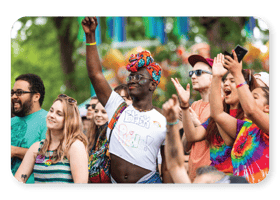Becoming an event planner can be a fulfilling and exciting career path. With the right skills,...
Strategies for Event Branding: Building a Strong Brand
In the buzzing world of events, a strong brand is your ticket to standing out and attracting a crowd. Event branding isn't just about a cool logo or catchy tagline; it's about creating an unforgettable experience that clicks with your audience.
In this blog, we'll explore fun and effective strategies to build a killer event brand that people will remember long after the event.
Table of contents:
Importance of event branding
Stand out
We all know that event branding is important, but what are the true benefits of having a great brand?
Having a consistent brand helps your event stand out by giving it a unique identity, making it memorable for attendees. A strong, consistent brand, including a distinct logo and color scheme, ensures people recognize and remember your event. In addition, a memorable brand is tied to the event experience, so it is vital to represent your brand properly.
Trust and credibility
Good branding builds trust and credibility, showing professionalism and reliability. This trust encourages people to attend and recommend your event to others. Effective brand messaging also creates an emotional connection with your audience, making them feel more engaged and invested.
Higher ROI
In addition, a well-branded event can attract more attendees, sponsors, and partners, leading to higher revenue. It can justify higher ticket prices and attract premium sponsors. Consistent branding across all aspects of your event ensures attendees a seamless and professional experience, reinforcing your brand.
Better positioning
Branding also helps you position your event strategically, targeting specific demographics and communicating your event's unique value. In the long run, building a strong brand creates a loyal community around your event, ensuring your continued growth and success.
Defining your brand identity
Your brand identity includes the visual and emotional aspects that define your event. This means your logo, colors, fonts, and overall look. It's essential that your brand identity matches the spirit of your event and attracts your target audience. Begin by clearly defining your event's mission, values, and goals, and then express these in your visual elements.
Creating a memorable logo and tagline
Creating a memorable logo and tagline for your event starts with understanding your event and creating an event branding strategy.
Your logo should be simple, straightforward, and easy to recognize, whether it's on an event website or a flyer. It should show what makes your event memorable. Your tagline, which is a short phrase, should also quickly explain why people should come to your event.
It is important to get opinions from others, like friends or people who might attend your event, to make sure they like your logo and tagline. Once you've chosen them, use them everywhere—on posters, online, and emails. This makes your event accessible to recognize and remember.
Here are a few examples of successful event branding ideas that are catchy and easy to remember:
- Nike: "Just Do It"
- Apple: "Think Different"
- Walmart: "Save Money. Live Better"
- "McDonald's: "I'm Lovin' It"
- Eventeny: "Outfox Chaos. Plan easier, live better"
- Disneyland: "The Happiest Place on Earth"
- Subway: "Eat Fresh"
- State Farm: "Like a Good Neighbor, State Farm is There"
Consistent branding across all platforms
It's super important to keep branding consistent. Use the same logo, colors, and style everywhere—on your website, social media, emails, and posters.
When everything looks alike, it helps people remember your event and understand what it's about. Imagine seeing the same cool logo and colors every time you hear about an event. It makes it easier for everyone to recognize and understand what the event is all about. So, keeping everything consistent makes your event stand out and be more memorable!
Engaging your audience through storytelling
Storytelling is a powerful way to connect with your audience. Sharing the story of your event—how it started, its purpose, and the experience you want people to have—helps them feel more connected. Use interesting stories in your ads, social media posts, and during the event to grab people's attention and keep them interested.
For example, discuss why your event was created, what inspired it, and how it has grown. Show how it has made a difference to people who attended before or to the community. During the event, keep telling stories with pictures, people's stories, and updates to make attendees feel part of your event's story. This informs them and makes them care more about your event's goals and success. IFEA (The International Festivals & Events Association) does a great job of doing this on its About page.
Leveraging partnerships and sponsorships
Partnering with other brands and organizations can make your event even better. When you team up with companies that share your event's values, it strengthens your brand. These partnerships bring in more resources, like money or equipment, that you need. They also help more people learn about your event, which boosts its visibility.
Working with respected brands adds credibility to your event. It shows that other companies trust and support what you're doing. This can encourage more people to attend and make your event a success. Choosing the right partners can help your event grow and make a bigger impact. To learn more about how to partner with sponsors, read on here.
Utilizing social media for brand promotion
Create engaging content
Interacting with your audience is critical. Respond promptly to comments and messages to build a connection with your followers. Encourage them to share their thoughts and experiences related to your event, fostering a sense of community.
Collaborate with influencers
Collaborating with influencers or industry leaders who resonate with your audience can significantly boost your event's visibility and credibility. Their endorsement can introduce your event to new audiences and enhance its reputation.
Contests, giveaways, and promotions
Engaging your audience through contests, giveaways, and promotions is also an effective way to promote your event. These activities encourage participation and create excitement and anticipation around your event. Use social media to announce ticket sales, special promotions, and important updates, providing clear calls-to-action to drive ticket purchases.
User-generated content
Additionally, sharing user-generated content—such as photos, testimonials, and reviews—can showcase attendeesexperiences and encourage others to join in. Monitor analytics to track engagement metrics like likes, shares, and comments. This data helps you understand what content resonates most with your audience, allowing you to refine your strategy and improve future campaigns. You can also partner with platforms that you use to spread the name.
For example, Avalon Park Group, partnered with Eventeny in a case study to showcase their success with the platform, gaining more traction from other event organizers.
By leveraging social media in these ways, you can build momentum, increase attendee engagement, and ultimately drive a successful branding strategy.
Conclusion
In a nutshell, event branding is your secret weapon for a knockout event! It makes your event pop with a unique vibe that people remember.
Good branding builds trust and credibility, making folks eager to attend and spread the word. Plus, it pulls in more attendees, sponsors, and partners, boosting your revenue. Keep your branding consistent and tell engaging stories to keep your audience hooked. By defining your brand, having a good brand experience, crafting a cool logo and tagline, and staying consistent on social media, you'll ensure your event is a smashing success!




